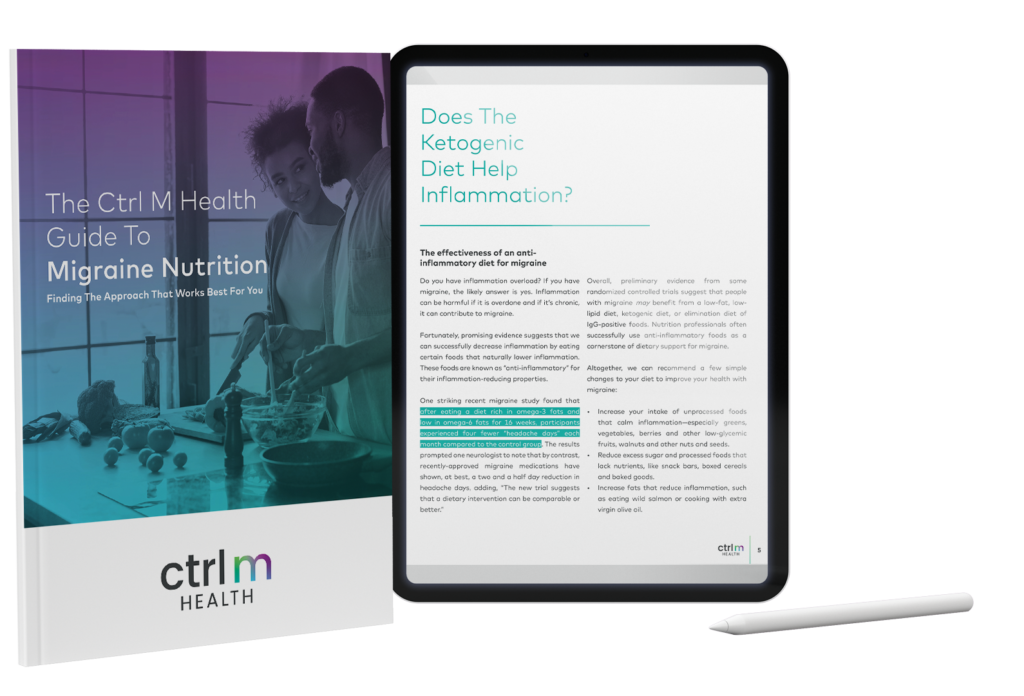Your body needs the right amount of vitamins and minerals to function properly. One of those minerals is magnesium, which occurs naturally in foods like spinach, legumes, nuts, seeds, and whole grains.
Magnesium is required for energy production and plays an important role in many of the body’s biochemical reactions. This includes muscle and nerve function, blood glucose, blood pressure, and protein synthesis. Magnesium is also intriguing to headache researchers because of its potential as a supplement for headaches.
Magnesium for migraine: Are you getting enough magnesium?
 The recommended daily allowance of magnesium is around 300 mg for women and 400 mg for men. Most Americans don’t get nearly that amount. A magnesium deficiency can reveal itself in a number of ways:
The recommended daily allowance of magnesium is around 300 mg for women and 400 mg for men. Most Americans don’t get nearly that amount. A magnesium deficiency can reveal itself in a number of ways:
-
- Early signs include loss of appetite, nausea, vomiting, fatigue, and weakness.
- Magnesium supplements are widely used to treat premenstrual syndrome, since women with PMS have low magnesium levels.
- In people who are deficient, magnesium supplements can calm anxiety and stress. Even magnesium-deficient mice show anxiety-related behaviors.
Magnesium and migraine research
Multiple studies have shown that migraine patients are often deficient in magnesium. The studies found that magnesium deficiency is, itself, a risk factor for migraine. The relationship between magnesium and headache has been suggested by a large body of scientific literature, including:
-
- In a double-blind randomized study of 81 people with migraine, half took a large dose of magnesium (600 mg) daily for 12 weeks; the other half was given a placebo. By the final month, the magnesium group had shown dramatic improvement. Migraine attack frequency was reduced by 41.6%, as opposed to 15.8% in the placebo group. The magnesium-takers also had fewer migraine days.
-
- A double-blind randomized study of 20 women with menstrual migraine showed a significant reduction in headache frequency for those who took 360 mg per day for two months. The placebo group showed no change in frequency.
Many good-quality studies have shown magnesium’s efficacy in reducing the frequency of migraine. Several headache organizations—including the American Academy of Neurology and the American Headache Society—now recommend magnesium for migraine.
Side effects of magnesium
Magnesium in the wrong formulation can cause diarrhea as a side effect. This matters when discussing which magnesium is best for migraines. There are seven forms of magnesium, each of which is absorbed by the gut at different rates.
Some have low absorption rates, which cause it to pass through the small intestine largely undigested, resulting in diarrhea. For example, magnesium citrate and magnesium oxide are two forms that have been used in studies. Other forms, like magnesium malate, are easily absorbed and therefore easier on the digestive tract.
If you have kidney disease, consult your healthcare professional before taking magnesium for migraine. It’s always best to check with your doctor first if you’re considering taking any dietary supplements for the first time. This is especially important if you are pregnant, nursing, taking any medications, or have any medical conditions.
To learn more about the research behind magnesium for migraine, visit our magnesium research page.
The Care Tuner Guide to Migraine Nutrition
Research shows that the types of foods we eat, and when we eat, have an impact on our migraine. Our new eBook helps you understand the link between migraine and nutrition.






